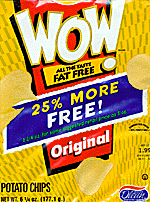Olestra
The fat that's not a fat?
It looks like fat, tastes like fat, so it must be
fat? Right? Wrong.
By now,
you've probably tasted one of the products, perhaps ice cream
or potato chips, made with the "fake fat" Olestra (trade
name is Olean). Olestra has become a popular food additive because
it can be used instead of fat while providing no calories.
 Actually, Olestra is not a fat at all. It's a carbohydrate that has
an oily texture and is similar to fat in taste. Because it's
not a real fat, it doesn't hold up under high temperatures, therefore,
it can't be used well in cooking and baking at home. Actually, Olestra is not a fat at all. It's a carbohydrate that has
an oily texture and is similar to fat in taste. Because it's
not a real fat, it doesn't hold up under high temperatures, therefore,
it can't be used well in cooking and baking at home.
Although this
is a great new product if you're trying to cut down on fat and
cholesterol, there are some problems with its use. A major concern
is that long-term use of Olestra may cause a deficiency of Vitamins
A, D, E, and K
which
need fat in order to be absorbed and utilized. In addition, Olestra
has been reported to cause severe side effects in some people
such as diarrhea,
abdominal cramping, and bloating. The product manufacturer, therefore,
was asked to put warning labels on their packages like the one
below:

Food is normally
absorbed into the body through the small intestine, but Olestra is not absorbed. Instead, it gathers in the intestinal
tract where it collects fluid until it's eventually eliminated
in the stool. It's during this time before elimination that problems
begin with diarrhea, gas, and painful cramping.
The FDA has been
requested to ban Olestra because of the health problems associated
with it. Proponents of the ban argue that Olestra is a food additive, not a natural substance found in food.
While we expect to develop side effects from medications we take,
we don't anticipate becoming ill from the food we eat. However,
those who oppose the ban feel that Olestra should remain on the
market because many people seem to be able to consume small amounts
with no problem at all.
Some suggestions:
- If you've never
eaten products made with Olestra, begin by consuming a small
amount to determine whether or not symptoms develop.
- Keep the use
of these products to a minimum.
- It's best to
eat foods containing Olestra in combination with other foods
rather than on an empty stomach.
- If you suffer
from intestinal disease, you might want to check with your doctor
first before consuming foods containing Olestra.
NUtritionTipS
-Simplesse
and Avicel are additives that are similarly being used as substitute
fats.
-To date, there is no evidence
that foods containing Olestra are beneficial in the prevention
of obesity.
-Even though a food product
may not contain fat, it still contains calories. Excess calories
are converted by the body to fat. Therefore, cutting down on
fat without cutting down on calories, will not result in weight
loss.
-All fat, whether animal or
vegetable fat, contain the same number of calories - 9 calories
per gram.
CarboH
Barbara Herondorf, L.D.
Home |
FAQ's |
Sample Menu |
Policies
More About CarboH |
Order CarboH |
Contact Us |
Letters
|


